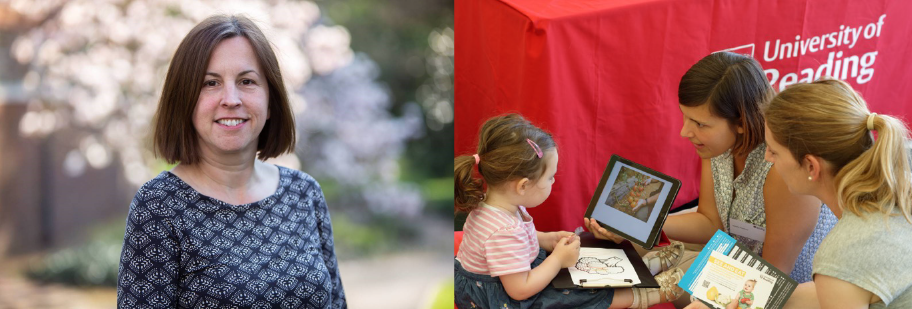Seeing images of vegetables can boost children’s intake – new eBooks launched to encourage children to eat their greens
Last Updated : 11 December 2019A variety of new resources, based on the evidence that children who are exposed to pictures of vegetables are more likely to eat them, have been launched as part of the See & Eat project, an initiative funded by European Institute of Innovation and Technology (EIT) Food, led by Professor Carmel Houston-Price at the University of Reading and supported by the British Nutrition Foundation (BNF).

Image: Professor Carmel Houston-Price, University of Reading (left), Dr Natalie Masento presenting the eBooks (right)
24 new eBooks, designed to help parents familiarise their young children with a greater variety of vegetables, are now available to download for free from the See and Eat Parent Resource website, along with numerous other resources, including meal planners, shopping lists, and family-friendly recipes, developed to support parents and carers in encouraging their children to eat more vegetables.
The ‘See & Eat’ eBooks each tell the farm to fork journey of a different vegetable and can be personalised with pictures, videos and text. The eBooks have been developed based on research showing that hard-copy books about vegetables help to familiarise children with new foods and, ultimately, help them to eat a wider variety.
The project team is currently conducting a study to understand whether extra interactivity and personalisation through eBooks, such as adding photos or videos of shopping for, preparing or eating vegetables, can support children to become even more receptive to new vegetables.
Dr Natalie Masento, a collaborator on the project at the University of Reading, comments: “It is well established that children often need 10-15 exposures to new foods before they accept them into their diets. But, having to prepare different vegetables on more than ten occasions, without them being eaten, can be very frustrating – and costly – for many parents. Research has shown, however, that children’s acceptance of new foods can be boosted purely by a food’s visual familiarity, for instance by looking at pictures.”
“The theory of food familiarisation through picture books is well accepted and we hope that, through easy-to-access eBooks, even more parents will be able to use this tool to support their children to eat their vegetables. Our current study – exploring the effects of personalisation and interactivity on children’s receptiveness to new vegetables – is looking positive and we’re excited to see the results next year.”
All of the See & Eat eBooks are free to download and are currently available in English and Italian. Next year, the eBooks will be launched in three further languages.
The project has been funded by EIT Food, the innovation community on food of the European Institute of Innovation and Technology (EIT), a body of the EU, under Horizon 2020, the EU Framework Programme for Research and Innovation. Partners involved in the project include: University of Reading, University of Torino, The European Food Information Council (EUFIC), Open University and Colruyt Group.
For further information or interviews please contact pressoffice@nutrition.org.uk, 01223 421 832.
Translating evidence-based nutrition science in engaging and actionable ways
BNF was established 50 years ago and exists to deliver authoritative, evidence-based information on food and nutrition in the context of health and lifestyle. The Foundation’s work is conducted and communicated through a unique blend of nutrition science, education and media activities. BNF’s strong governance is broad-based but weighted towards the academic community. BNF is a registered charity that attracts funding from a variety of sources, including contracts with the European Commission, national government departments and agencies; food producers and manufacturers, retailers and food service companies; grant providing bodies, trusts and other charities. Further details about our work, governance and funding can be found on our website (www.nutrition.org.uk) and in our Annual Reports.